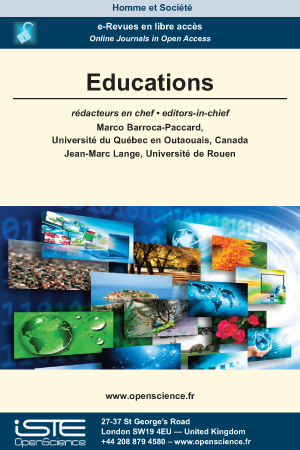

Social Sciences and Humanities > Home > Educations > Issue
Citizenship education for school age children and adolescents has mostly been explored from a disciplinary perspective, and based on the idea that youth are future citizens who must first acquire knowledge before they can exercise their citizenship. For its part, environmental education inscribed within a sustainable development framework has at times restricted itself to an individualistic, small acts perspective, thus distancing itself from the imperative of collective and militant eco-citizenship action. This introduction aims to question the institutional limits to citizenship and environmental education, as well as education for sustainable development, and to introduce papers which propose ways to expand the still uncertain horizons of an ecologist citizenship education.
As part of a project on the interdisciplinary representation of priority issues associated with the sustainable development of the Seine, 20 collective interviews were carried out with 59 students from three secondary schools in France. The analysis of the interviews determines three themes which relate to the individual and collective experience of the project, the relationship to ecological knowledge and the vision of nature and the territorial anchoring and protection of the river. Students emphasize the value of approaches that go beyond the traditional school form and that are linked with their local reality, both geographic and lived. The use of the theory of relation to knowledge leads to discussing the epistemic, social and identity dimensions involved in this work.
This article focuses on the narratives produced by students (14 to 17 years old) in relation to the issues of durability / sustainability. The students concerned by the study are at the end of their compulsory schooling. In the present case, their narratives include a part of socially valued discourse, but also the expression of a certain perplexity to a lesser extent. First we present the context and objectives of the reference program, then the methodology of data collection and analysis, and finally the main results obtained at this stage of the investigation. The hypothesis of tensions among the students’ representations is discussed. We show on this occasion the extent to which it is appropriate to relativize the role of reflection that the School would be expected to play on these educational issues.
This article aims to update the main determinants of the engagement of young people opposite the challenges of sustainability / sustainability and arrived at the end of compulsory schooling. It is a continuation of the work carried out during a previous program based on a qualitative methodology for discourse analysis. The method used here is based on a statistical analysis of the results of a questionnaire survey. It leads to the identification, in a statistically significant way, of 8 main determinants which characterize 5 types of commitment among 14 - 17 year olds in a school context.
This research follows the perspective of political, emancipatory, critical, creative, and engaging education allowing tto overcome two fundamental epistemic and social inhibitions which generate doubt or even renunciation of individual or collective possibilities to transform the world for an ecological transition. Five profiles of the eco-citizen engagement of young people arriving at the end of compulsory education (14-17 years) were established by means of a questionnaire survey (n = 170) updating and thus specifying the results obtained during a previous research. These results are now completed by the sociological and territorial characterization, but also cognitive dimensions, such as Socio Scientific Reasoning in the perspective of Sustainability, of the five profiles, by means of focus groups. The dynamics of interactions, the relationship to knowledge and to the World, in relation to identity, as well as social and epistemic dimensions, are taken into account in this framework and parameterized in order to determine contextualized and therefore more efficient socio-didactic strategies.
One of the specificities of Francophone "éducations à" is the implement of significant behavioral changes. However, action could lead to this without any critical dimension. So it is important to think how the articulation between scientists knowledge and values can lead to change environmental actions. We introduce reflections elements that lead to a possible “espace de contraintes” model of environmental and sustainable education based on the framework of " problématisation". This model consider the links between empirical register, intrinsic value and actions (as a meaning of answers considering a problem under study). An example based on biodiversity conservation based on a secondary school class in France point the potential interest of this model.

2024
Volume 24- 8
Issue 12023
Volume 23- 7
Issue 12022
Volume 22- 6
Issue 12021
Volume 21- 5
Issue 12020
Volume 20- 4
Special issue2019
Volume 19- 3
Issue 12018
Volume 18- 2
Issue 12017
Volume 17- 1
Issue 1